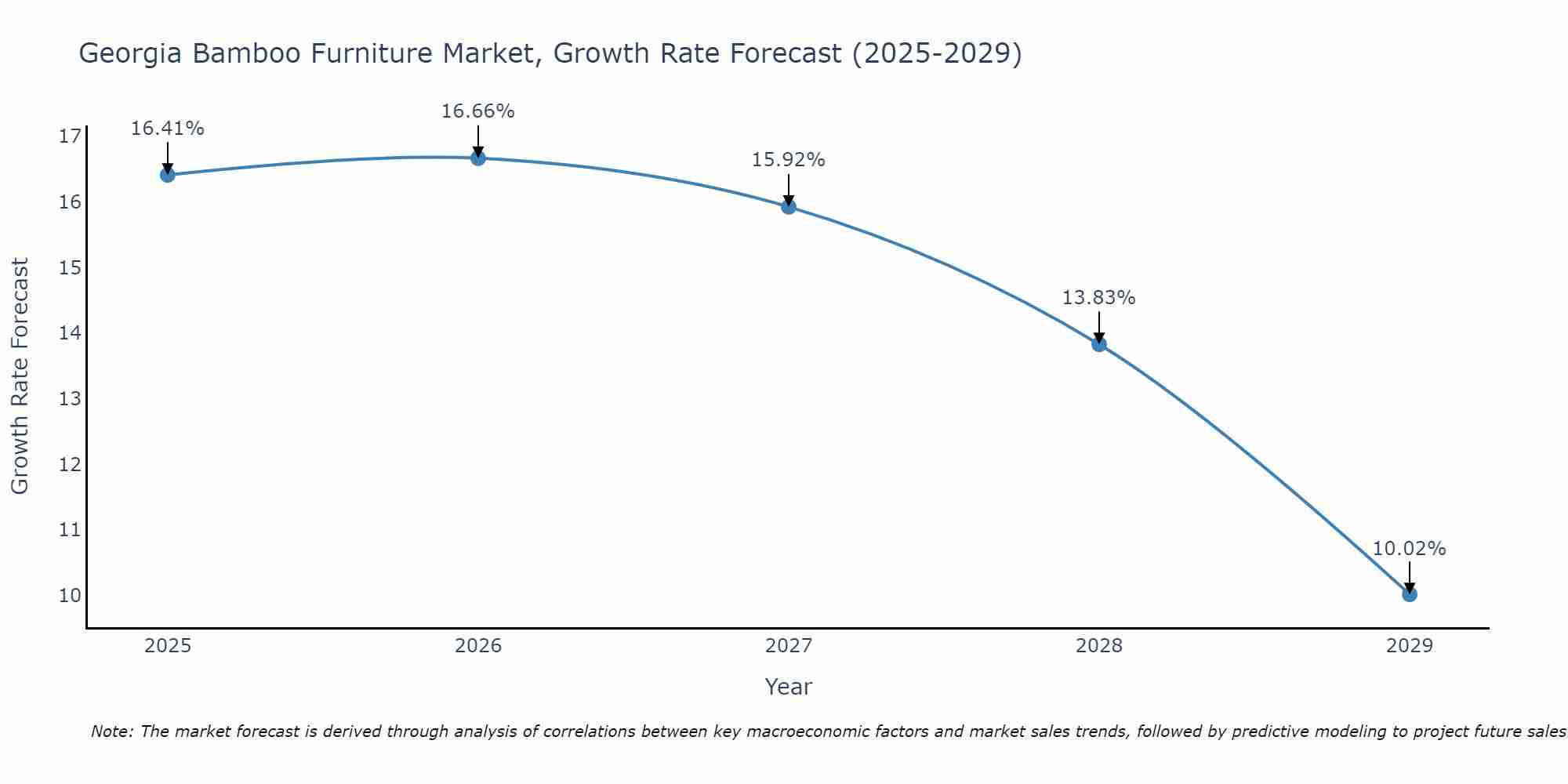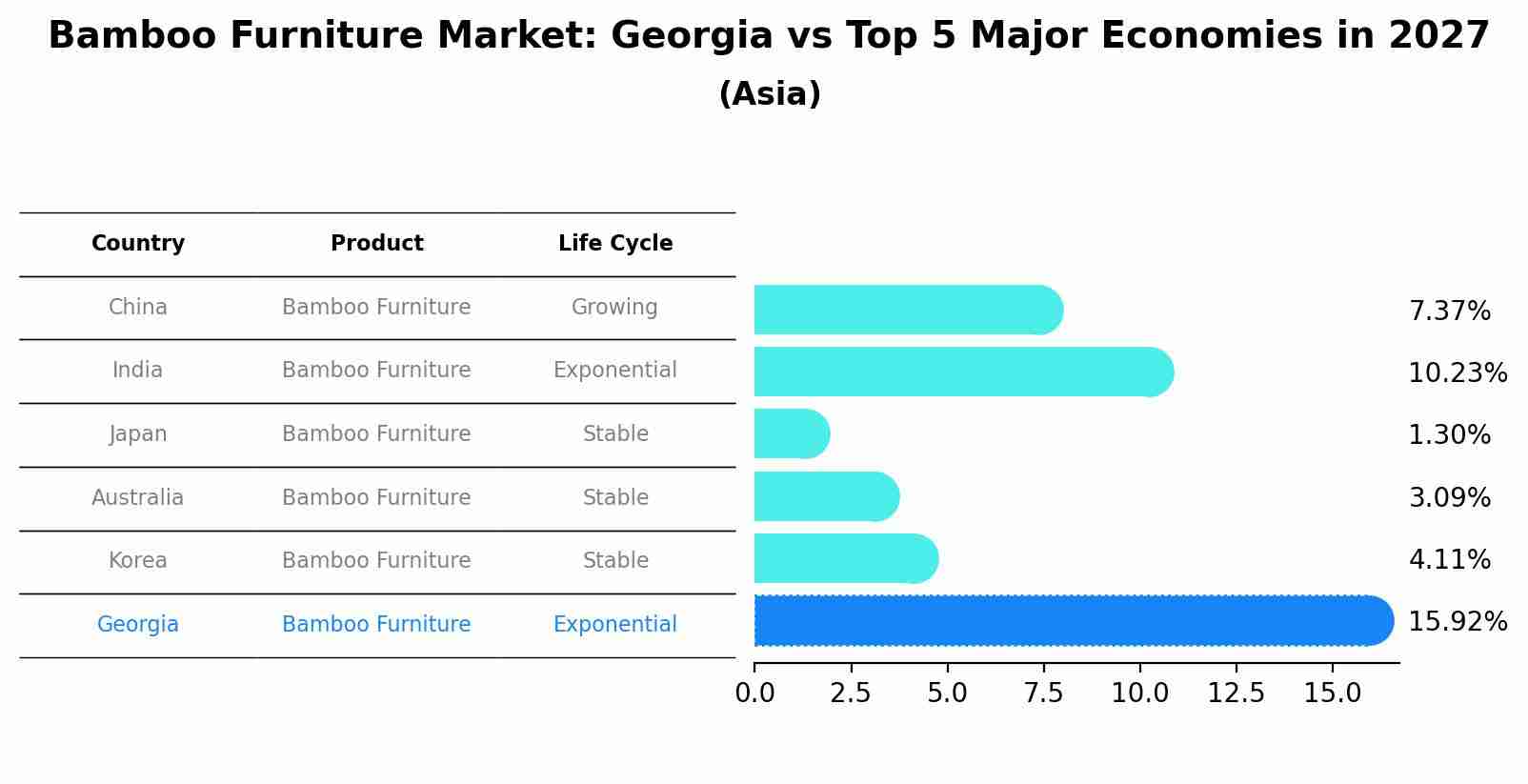Georgia Bamboo Furniture Market (2025-2031) Outlook | Size, Forecast, Companies, Share, Analysis, Value, Growth, Trends, Industry & Revenue
| Product Code: ETC370920 | Publication Date: Aug 2022 | Updated Date: Jul 2025 | Product Type: Market Research Report | |
| Publisher: 6Wresearch | Author: Ravi Bhandari | No. of Pages: 75 | No. of Figures: 35 | No. of Tables: 20 |
Georgia Bamboo Furniture Market Size Growth Rate
The Georgia Bamboo Furniture Market is projected to witness mixed growth rate patterns during 2025 to 2029. Growth accelerates to 16.66% in 2026, following an initial rate of 16.41%, before easing to 10.02% at the end of the period.

Bamboo Furniture Market: Georgia vs Top 5 Major Economies in 2027 (Asia)
The Bamboo Furniture market in Georgia is projected to grow at a exponential growth rate of 15.92% by 2027, highlighting the country's increasing focus on advanced technologies within the Asia region, where China holds the dominant position, followed closely by India, Japan, Australia and South Korea, shaping overall regional demand.

Georgia Bamboo Furniture Market Synopsis
The Georgia Bamboo Furniture Market is experiencing steady growth due to the increasing demand for sustainable and eco-friendly furniture options. Consumers in Georgia are increasingly aware of the environmental impact of traditional furniture materials and are turning towards bamboo furniture for its sustainability and durability. The market offers a variety of bamboo furniture options, including chairs, tables, beds, and storage units, catering to diverse consumer preferences. With a focus on modern and minimalist designs, bamboo furniture is becoming a popular choice among homeowners, interior designers, and businesses in Georgia. The market is also witnessing a rise in online retail channels, making it easier for consumers to access a wider range of bamboo furniture products and driving further market growth.
Georgia Bamboo Furniture Market Trends
The Georgia Bamboo Furniture Market is experiencing a growing trend towards sustainable and eco-friendly furniture options. Consumers are increasingly seeking furniture made from bamboo due to its sustainability, durability, and stylish aesthetics. Bamboo furniture is known for its strength and versatility, making it a popular choice for both indoor and outdoor settings. Additionally, the trend towards natural and organic materials in home decor has contributed to the rising demand for bamboo furniture in Georgia. Manufacturers and retailers are responding to this trend by offering a wide range of bamboo furniture options, including beds, tables, chairs, and decor pieces. Overall, the Georgia Bamboo Furniture Market is witnessing a shift towards environmentally conscious choices and a preference for stylish yet sustainable furniture solutions.
Georgia Bamboo Furniture Market Challenges
In the Georgia Bamboo Furniture Market, some challenges that may be faced include limited consumer awareness and demand for bamboo furniture compared to traditional materials, such as wood or metal. Additionally, sourcing high-quality and sustainable bamboo materials at competitive prices could present a challenge for manufacturers. The lack of specialized skills and knowledge in bamboo furniture craftsmanship among local artisans and manufacturers may also hinder the growth of the market. Furthermore, competition from other eco-friendly furniture options and the need for effective marketing strategies to promote the benefits of bamboo furniture in terms of sustainability and durability may pose obstacles for companies operating in this niche market. Overcoming these challenges would require targeted marketing efforts, investment in skills development, and partnerships with sustainable bamboo suppliers to capitalize on the growing interest in eco-friendly furniture options in Georgia.
Georgia Bamboo Furniture Market Investment Opportunities
The Georgia Bamboo Furniture Market presents promising investment opportunities due to the growing demand for sustainable and eco-friendly furniture options. Bamboo is a fast-growing and renewable resource, making it an attractive choice for environmentally conscious consumers. Investing in manufacturing facilities or retail outlets that specialize in bamboo furniture could capitalize on this trend. Additionally, there is potential for innovation in product design and marketing strategies to target a niche market segment seeking unique and sustainable furniture options. Collaborating with local artisans or designers to create custom bamboo furniture pieces could also differentiate offerings in the market and attract a premium price point. Overall, the Georgia Bamboo Furniture Market offers a fertile ground for investors looking to tap into the sustainable living trend and cater to environmentally conscious consumers.
Jordan Agar Market Government Policies
The Georgia Bamboo Furniture Market is influenced by various government policies aimed at promoting sustainable practices and supporting local industries. The state government has implemented initiatives to encourage the use of eco-friendly materials such as bamboo in furniture production, offering incentives and subsidies to manufacturers who adopt these practices. Additionally, there are regulations in place to ensure that bamboo sourcing and harvesting are done in an environmentally responsible manner, promoting the conservation of natural resources. The government also supports the growth of the bamboo furniture market through trade agreements and export promotion strategies, providing opportunities for local manufacturers to expand their reach internationally. Overall, government policies in Georgia are focused on fostering a sustainable and competitive bamboo furniture industry that aligns with global trends towards environmental conservation and responsible production.
Georgia Bamboo Furniture Market Future Outlook
The Georgia Bamboo Furniture Market is expected to experience steady growth in the coming years due to the increasing consumer preference for sustainable and eco-friendly furniture options. Bamboo`s rapid growth and renewability make it an attractive choice for environmentally conscious consumers, driving demand for bamboo furniture in the region. Additionally, the rising trend of incorporating natural elements and textures into interior design is expected to further boost the market for bamboo furniture in Georgia. Manufacturers are likely to focus on innovation and design to cater to diverse consumer preferences, leading to a more competitive market landscape. Overall, the Georgia Bamboo Furniture Market is poised for expansion, driven by sustainability trends and changing consumer preferences.
Key Highlights of the Report:
- Georgia Bamboo Furniture Market Outlook
- Market Size of Georgia Bamboo Furniture Market, 2024
- Forecast of Georgia Bamboo Furniture Market, 2031
- Historical Data and Forecast of Georgia Bamboo Furniture Revenues & Volume for the Period 2021 - 2031
- Georgia Bamboo Furniture Market Trend Evolution
- Georgia Bamboo Furniture Market Drivers and Challenges
- Georgia Bamboo Furniture Price Trends
- Georgia Bamboo Furniture Porter's Five Forces
- Georgia Bamboo Furniture Industry Life Cycle
- Historical Data and Forecast of Georgia Bamboo Furniture Market Revenues & Volume By Type for the Period 2021 - 2031
- Historical Data and Forecast of Georgia Bamboo Furniture Market Revenues & Volume By Chairs & Tables for the Period 2021 - 2031
- Historical Data and Forecast of Georgia Bamboo Furniture Market Revenues & Volume By Stools for the Period 2021 - 2031
- Historical Data and Forecast of Georgia Bamboo Furniture Market Revenues & Volume By Beds for the Period 2021 - 2031
- Historical Data and Forecast of Georgia Bamboo Furniture Market Revenues & Volume By Others for the Period 2021 - 2031
- Historical Data and Forecast of Georgia Bamboo Furniture Market Revenues & Volume By End User for the Period 2021 - 2031
- Historical Data and Forecast of Georgia Bamboo Furniture Market Revenues & Volume By Residential for the Period 2021 - 2031
- Historical Data and Forecast of Georgia Bamboo Furniture Market Revenues & Volume By Commercial for the Period 2021 - 2031
- Georgia Bamboo Furniture Import Export Trade Statistics
- Market Opportunity Assessment By Type
- Market Opportunity Assessment By End User
- Georgia Bamboo Furniture Top Companies Market Share
- Georgia Bamboo Furniture Competitive Benchmarking By Technical and Operational Parameters
- Georgia Bamboo Furniture Company Profiles
- Georgia Bamboo Furniture Key Strategic Recommendations
Frequently Asked Questions About the Market Study (FAQs):
- Single User License$ 1,995
- Department License$ 2,400
- Site License$ 3,120
- Global License$ 3,795
Search
Related Reports
- ASEAN Bearings Market (2025-2031) | Strategy, Consumer Insights, Analysis, Investment Trends, Opportunities, Growth, Size, Share, Industry, Revenue, Segments, Value, Segmentation, Supply, Forecast, Restraints, Outlook, Competition, Drivers, Trends, Demand, Pricing Analysis, Competitive, Strategic Insights, Companies, Challenges
- Europe Flooring Market (2025-2031) | Outlook, Share, Industry, Trends, Forecast, Companies, Revenue, Size, Analysis, Growth & Value
- Saudi Arabia Manlift Market (2025-2031) | Outlook, Size, Growth, Trends, Companies, Industry, Revenue, Value, Share, Forecast & Analysis
- Uganda Excavator, Crane, and Wheel Loaders Market (2025-2031) | Strategy, Consumer Insights, Analysis, Investment Trends, Opportunities, Growth, Size, Share, Industry, Revenue, Segments, Value, Segmentation, Supply, Forecast, Restraints, Outlook, Competition, Drivers, Trends, Demand, Pricing Analysis, Competitive, Strategic Insights, Companies, Challenges
- Rwanda Excavator, Crane, and Wheel Loaders Market (2025-2031) | Strategy, Consumer Insights, Analysis, Investment Trends, Opportunities, Growth, Size, Share, Industry, Revenue, Segments, Value, Segmentation, Supply, Forecast, Restraints, Outlook, Competition, Drivers, Trends, Demand, Pricing Analysis, Competitive, Strategic Insights, Companies, Challenges
- Kenya Excavator, Crane, and Wheel Loaders Market (2025-2031) | Strategy, Consumer Insights, Analysis, Investment Trends, Opportunities, Growth, Size, Share, Industry, Revenue, Segments, Value, Segmentation, Supply, Forecast, Restraints, Outlook, Competition, Drivers, Trends, Demand, Pricing Analysis, Competitive, Strategic Insights, Companies, Challenges
- Angola Excavator, Crane, and Wheel Loaders Market (2025-2031) | Strategy, Consumer Insights, Analysis, Investment Trends, Opportunities, Growth, Size, Share, Industry, Revenue, Segments, Value, Segmentation, Supply, Forecast, Restraints, Outlook, Competition, Drivers, Trends, Demand, Pricing Analysis, Competitive, Strategic Insights, Companies, Challenges
- Israel Intelligent Transport System Market (2025-2031) | Strategy, Consumer Insights, Analysis, Investment Trends, Opportunities, Growth, Size, Share, Industry, Revenue, Segments, Value, Segmentation, Supply, Forecast, Restraints, Outlook, Competition, Drivers, Trends, Demand, Pricing Analysis, Competitive, Strategic Insights, Companies, Challenges
- Uganda Precast and Aggregate Market (2025-2031) | Strategy, Consumer Insights, Analysis, Investment Trends, Opportunities, Growth, Size, Share, Industry, Revenue, Segments, Value, Segmentation, Supply, Forecast, Restraints, Outlook, Competition, Drivers, Trends, Demand, Pricing Analysis, Competitive, Strategic Insights, Companies, Challenges
- Australia IT Asset Disposal Market (2025-2031) | Strategy, Consumer Insights, Analysis, Investment Trends, Opportunities, Growth, Size, Share, Industry, Revenue, Segments, Value, Segmentation, Supply, Forecast, Restraints, Outlook, Competition, Drivers, Trends, Demand, Pricing Analysis, Competitive, Strategic Insights, Companies, Challenges
Industry Events and Analyst Meet
Our Clients
Whitepaper
- Middle East & Africa Commercial Security Market Click here to view more.
- Middle East & Africa Fire Safety Systems & Equipment Market Click here to view more.
- GCC Drone Market Click here to view more.
- Middle East Lighting Fixture Market Click here to view more.
- GCC Physical & Perimeter Security Market Click here to view more.
6WResearch In News
- Doha a strategic location for EV manufacturing hub: IPA Qatar
- Demand for luxury TVs surging in the GCC, says Samsung
- Empowering Growth: The Thriving Journey of Bangladesh’s Cable Industry
- Demand for luxury TVs surging in the GCC, says Samsung
- Video call with a traditional healer? Once unthinkable, it’s now common in South Africa
- Intelligent Buildings To Smooth GCC’s Path To Net Zero













